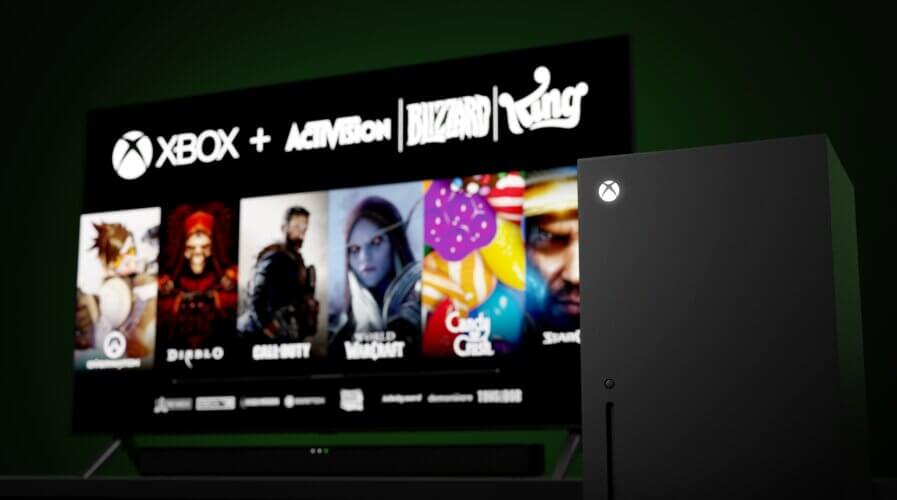
Is Britain’s decision on Microsoft and Activision a deal-killer?Source: Shutterstock
Is it game over for Microsoft as UK regulators block Activision deal?
|
Getting your Trinity Audio player ready... |
- Microsoft is appealing the UK regulators’ decision to block the planned acquisition of Activision Blizzard.
- With verdict in the US and EU still pending, the British ruling could be a deal-breaker.
The era of easy blockbuster tech deals may just be over, or at least, that is what the Microsoft and Activision deal–-which has faced numerous regulatory hurdles–tells us. The latest being the British antitrust regulators, who, on April 26, inflicted a possibly fatal blow to what would be the largest consumer tech acquisition.
The UK Competition and Markets Authority (CMA) blocking Microsoft’s proposed deal to acquire the video game giant Activision Blizzard for US$69 billion was a clear victory for proponents of regulating tech giants.
It all started in January 2022 when Microsoft and Activision announced the largest-ever deal for the software maker and within the video game industry. The deal would give the Xbox maker control of one of the biggest video game companies in the world, including popular gaming franchises like Call of Duty, Overwatch, and World of Warcraft.
In short, Microsoft will become the world’s third-largest gaming company by revenue, behind Tencent and Sony, when and if the deal closes. Microsoft has set a goal since then to have the deal finalized and completed by this year.
Unfortunately, Microsoft has been caught in a pickle since the agreement came to light, trying to convince regulators worldwide, including the US Federal Trade Commission (FTC), that its acquisition won’t hurt competition in the video game industry.
A failure to gain approval in a large market like Britain or the US could force Microsoft to walk away from the acquisition, even though another regulatory body in the European Union (EU) has yet to make a final decision. Antitrust regulators in the bloc are expected to rule on the acquisition by May 22 this year.
Microsoft has set a deadline to close the Activision acquisition by July 18. If its appeal fails, the company will have to walk away and pay Activision a US$3 billion breakup fee, ending what would have been one of the biggest shake-ups to the gaming industry in decades.
To add salt to the wound, just last week, the US FTC said it was aligned with the British regulator. “We also have concerns, as explained in our complaint, about the anticompetitive effects of this deal,” Holly Vedova, the agency’s Bureau of Competition director, said in a statement.
Not long after, UK’s CMA rejected the Microsoft and Activision deal, saying it would result in higher prices and fewer choices for gamers. The decision was a significant blow for Microsoft, and its President Brad Smith even said the company was “very disappointed” and described the CMA’s decision as “bad for Britain.”
The CMA, on the other hand, said moves by Microsoft, such as promising to bring blockbuster Activision game Call of Duty to Nintendo consoles, didn’t effectively address concerns that the deal would stifle competition in cloud gaming. But the game’s not over.
In a statement posted to Twitter, Smith said the company remains “fully committed” to the acquisition, noting that it has “already signed contracts to make Activision Blizzard’s popular games available on 150 million more devices.” Sharing Microsoft’s enthusiasm, Activision Blizzard CEO Bobby Kotick also told employees that the CMA’s decision is “far from the final word on this deal.”
We remain fully committed to our acquisition with @ATVI_AB and will appeal today's determination by the CMA. Here's our statement. pic.twitter.com/ylvDP5RUqQ
— Brad Smith (@BradSmi) April 26, 2023
Ultimately, Microsoft and Activision are not giving up and plan to appeal the decision. But for CMA, “Cloud gaming needs a free, competitive market to drive innovation and choice,” said Martin Coleman, chair of an independent panel investigating the deal.
What’s next for Microsoft and Activision?
SVB Securities Research analyst Clay Griffin said in an April 26 investor note, “For Microsoft and Activision, we suspect the CMA decision is a deal-killer.” For now, Griffin sees the Competition Appeal Tribunal in the UK, to whom Microsoft will now scramble to overturn the ruling, being the only option.
Other analysts are throwing up their hands, agreeing that Microsoft has little chance of successfully appealing the UK ruling to revive the megadeal. “The CMA said that its primary concern was lessening competition and innovation in the cloud gaming market. While Microsoft and Activision indicated they would appeal, we think the chances of success are no more than 10%,” Doug Creutz, an analyst at TD Cowen, wrote in an investor note last week.
Despite being in its infancy, cloud gaming has been sending waves worldwide as the technology enables gamers to access games via companies’ remote servers — effectively streaming a game like you would a movie on Netflix. Microsoft has been betting on it becoming a mainstream way of playing games.
For CMA, however, “Allowing Microsoft to take such a strong position in the cloud gaming market just as it begins to proliferate would risk undermining the innovation crucial to developing these opportunities,” it said in a press release on April 26.
Activision’s Kotick also told employees that the company and Microsoft have “already begun the work to appeal to the UK Competition Appeals Tribunal.” He added that they are confident in their case because “the facts are on our side: this deal is good for competition,” he said.
READ MORE
- Safer Automation: How Sophic and Firmus Succeeded in Malaysia with MDEC’s Support
- Privilege granted, not gained: Intelligent authorization for enhanced infrastructure productivity
- Low-Code produces the Proof-of-Possibilities
- New Wearables Enable Staff to Work Faster and Safer
- Experts weigh in on Oracle’s departure from adland


